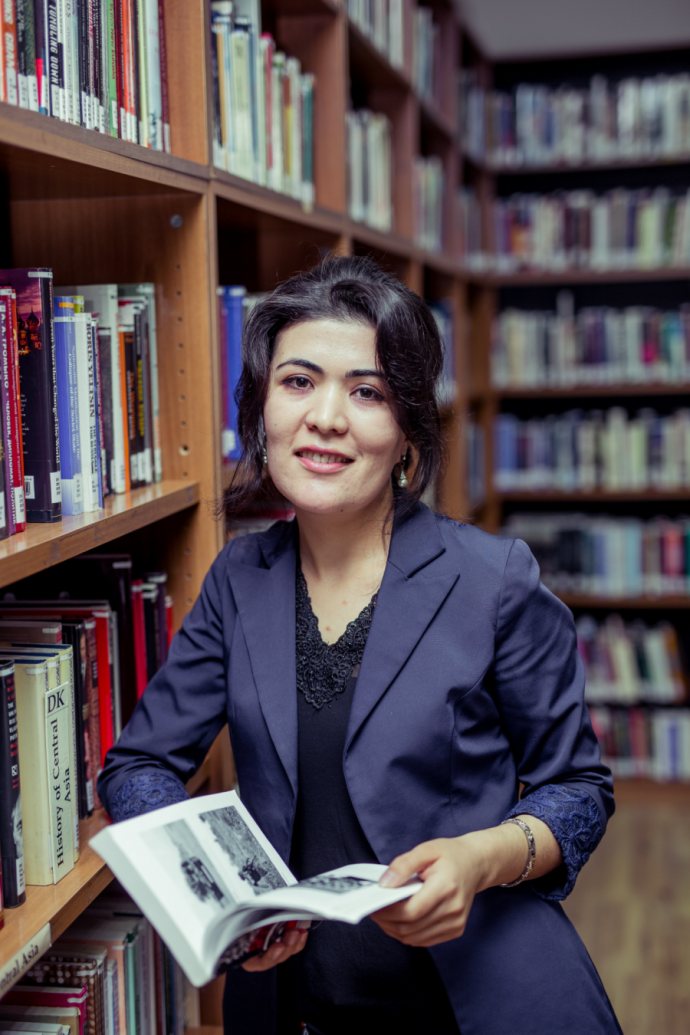Alumni Spotlight
“Every person is unique”: Working with Vulnerable to Help them Live Better
Umedakhon Pulotova is alumna of 2017, MA Programme in Economic Governance and Development from Tajikistan. Currently Umedakhon is working as Project Coordinator in two projects in the health-focused NGO “Ranginkamon” in Khujand, Tajikistan.
Q: Dear Umedakhon, please tell us about “Ranginka-mon”. What are its main goals and objectives?
“Ranginkamon” is a Tajik word which means “Rainbow”. NGO “Ranginkamon” was established in 2000. The main mission of the organization is to support the inclusion of children with disabilities in the society through the revitalization of family members of these children, the establishment of rehabilitation centres, education and training of specialists, and the organization of support in order to create an inclusive society. Since the beginning of its activities, members of Ranginkamon have implemented 25 large and partner projects worth over $ 1,500,000. Financial support was provided by international organizations such as: UNICEF, the European Commission, the SOROS Foundation, Caritas-Germany, Save the Children, Mission East, Public Foundation “FSDS Kyrgyzstan”, the Social Protection Agency of Tajikistan with the Ministry of Health and Social Protection of the Republic of Tajikistan. The main results of our activity are that now the parents are not hiding and shy of their disabled children; parents began to communicate with each other; improved attendance of children with disabilities and girls in public schools, kindergartens; Parents of Children with disabilities have their own legal organization to ensure the rights of their children and to empower other parents with disabled children; more than 300 disabled children and their parents received free classes on movement, speech and behavioral therapy; 4 inclusive schools and 4 inclusive kindergartens were opened in 4 rural areas. A memorandum of cooperation is signed between Ranginkamon and the Ministry of Health and Social Development of Tajikistan for the implementation and development of the early Intervention programme at the peripheral level with comprehensive social care and support. The programme includes five main areas of early childhood development for early intervention: medical screening and care, healthy feeding and nutrition, safe surroundings, education, social support for the family and the child. Ranginkamon is the coordinator of the Council from the beginning of its creation to today. Every year we have trainers/specialists from abroad, such as Israel, Germany, Ireland to train and teach our local specialists to new skills.
Q: The work that Ranginka-mon implements is very important. How did you become part of this organi-zation?
To be honest, it was unexpected. While still being in Bishkek, preparing for the defence of my master’s thesis (in early December 2017), I saw on the site of job seekers an advertisement for the vacancy “Project Coordinator” in Khujand on a partnership project with FSDS Kyr-gyzstan and Bread for the World (Germany) to the project “Inclusive Society for All”. After reviewing the description of the activity, I sent my CV and cover letter. A week later the employer replied to me and assigned a Skype interview, I passed the interview. I still remember that it was the 15 of December they emailed me that interview was successful and I was hired. Everything was right away: I did defend my thesis, soon graduation ceremony, and a new job. I did not expect to be hired, because I had more experience in the banking sector, but no experience with social projects. So, I returned from the Academy on December 17, and on December 19 already went to work - As they say “from the ship immediately to the ball”.))
Q: What are your responsi-bilities?
Right now, I am working as a project coordinator within two projects “Inclusive society for disabled children. Phase 2” and “Reducing the risk of childhood disability through improving food security and early intervention in vulnerable families of B. Gafurov district of the Sugd region”. The objectives of the first project are to promote that children with disabilities in Tajikistan have equal and barrier-free access to all public services, such as health services, education, poverty reduction, cultural and religious activities, and social relations. The goal of the second project is aimed at maintaining food security of 120 vulnerable households with limited incomes, having children from 0 to 3 years of age, lagging behind in development due to malnutrition. My responsibilities are: Participation in strategic management, in the direction of the programme, collection of data for general and overall reporting, representation, participation, design and monitoring of the programme, communication with donors and stakeholders, problem solving, current correspondence, logistics, collection of documentation and materials for approval, participation in budgeting and control over the distribution of financial resources. I was lucky that I had a chance to represent our organization in 4th Asia-Pacific Community Based Inclusive Development Congress which took place in Ulaanbaatar city, Mongolia from 1 to 4 July 2019 year.
Q: What part of your work do you like most?
I like every part of the project where I am working. I think that help-ing disabled children to develop their skills, prepare these children to enter society, to support families with disabled children to become change-makers in their own communities, helping them to join social and public programmes, and starting community level activities is the best practice what I am doing.
Q: How did it change your values and perception of the world?
Тo be honest, a lot has changed in my perception of the world and in my values. I don’t know how to say it right, but working in this project with vulnerable families, children with developmental problems, I realized that each person is unique and that’s his value. I think every life trifle is another lesson learned by a person, and the value of life is that the person gains life experience from it, which makes him wiser.



 Русская версия
Русская версия